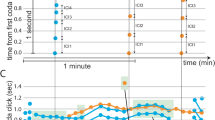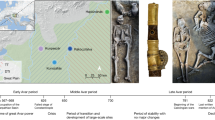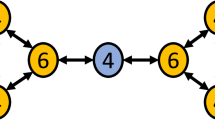Abstract
The ability to recognize conspecifics is a prerequisite for many types of social behaviour, including, for example, parent–offspring relations1,2, mate selection and recognition3,4, territorial defence5,6 and dominance coalitions7. This ability is of special importance to Hamilton's kin selection hypothesis8, which predicts that an individual's behaviour towards a conspecific will depend on the degree of genetic relatedness between them. Although recognition depends on previous experience between individuals in some species1,2, this does not preclude the possibility that recognition could occur in its absence12. For example, juveniles who disperse before non-littermate siblings are born or adult males who do not participate in rearing their young might benefit from recognition abilities that are independent of prior association between the individuals. Here we show that young pigtail macaques prefer to interact with a related over an unrelated monkey in a laboratory test. Because subjects were separated from their dams at birth and reared apart from all other relatives, results suggest that kin recognition can occur in the absence of prior association with relatives.
This is a preview of subscription content, access via your institution
Access options
Subscribe to this journal
Receive 51 print issues and online access
$199.00 per year
only $3.90 per issue
Buy this article
- Purchase on Springer Link
- Instant access to full article PDF
Prices may be subject to local taxes which are calculated during checkout
Similar content being viewed by others
References
Michener, G. R. Devl Psychobiol. 7, 375–384 (1974).
Beecher, M. D. & Beecher, I. M., in preparation.
Johnson, V. R. Anim. Behav. 25, 418–428 (1977).
Brooke, M. de L. Anim. Behav. 26, 622–629 (1978).
Emlen, S. T. Z. Tierpsychol. 28, 241–246 (1971).
Krebs, J. R. Ecology 52, 2–22 (1971).
Packer, C. Nature 265, 441–443 (1977).
Hamilton, W. D. J. theor. Biol. 7, 1–52 (1964).
Suomi, S. J., Sackett, G. P. & Harlow, H. F. Devl Psychol. 3, 326–336 (1970).
Salzen, E. A. & Cornell, J. M. Behavior 30, 44–65 (1968).
Massey, A. Behav. Ecol. Sociobiol. 2, 31–40 (1977).
Greenberg, L. Science 206, 1095–1097 (1979).
Author information
Authors and Affiliations
Rights and permissions
About this article
Cite this article
Wu, H., Holmes, W., Medina, S. et al. Kin preference in infant Macaca nemestrina. Nature 285, 225–227 (1980). https://doi.org/10.1038/285225a0
Received:
Accepted:
Issue Date:
DOI: https://doi.org/10.1038/285225a0
This article is cited by
-
Decoding an olfactory mechanism of kin recognition and inbreeding avoidance in a primate
BMC Evolutionary Biology (2009)
-
Paternal kin bias in the agonistic interventions of adult female rhesus macaques (Macaca mulatta)
Behavioral Ecology and Sociobiology (2006)
-
Sibmating and its fitness consequences in the parasitoid waspSpalangia cameroni (Hymenoptera: Pteromalidae)
Journal of Insect Behavior (1995)
-
Grooming site preferences in female langurs (Presbytis entellus)
International Journal of Primatology (1992)
-
Parental care and the allocation of resources across generations
Evolutionary Ecology (1992)
Comments
By submitting a comment you agree to abide by our Terms and Community Guidelines. If you find something abusive or that does not comply with our terms or guidelines please flag it as inappropriate.



